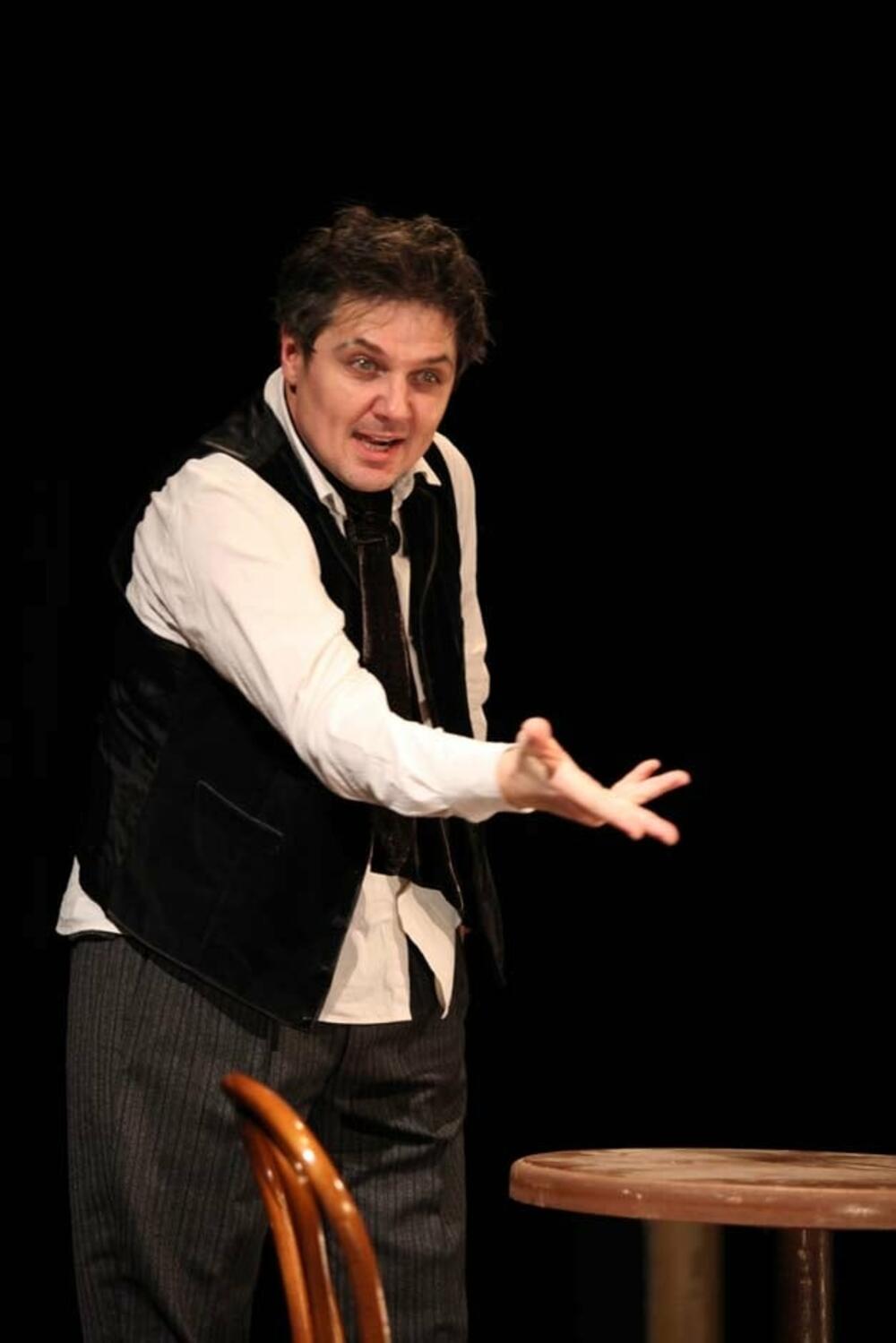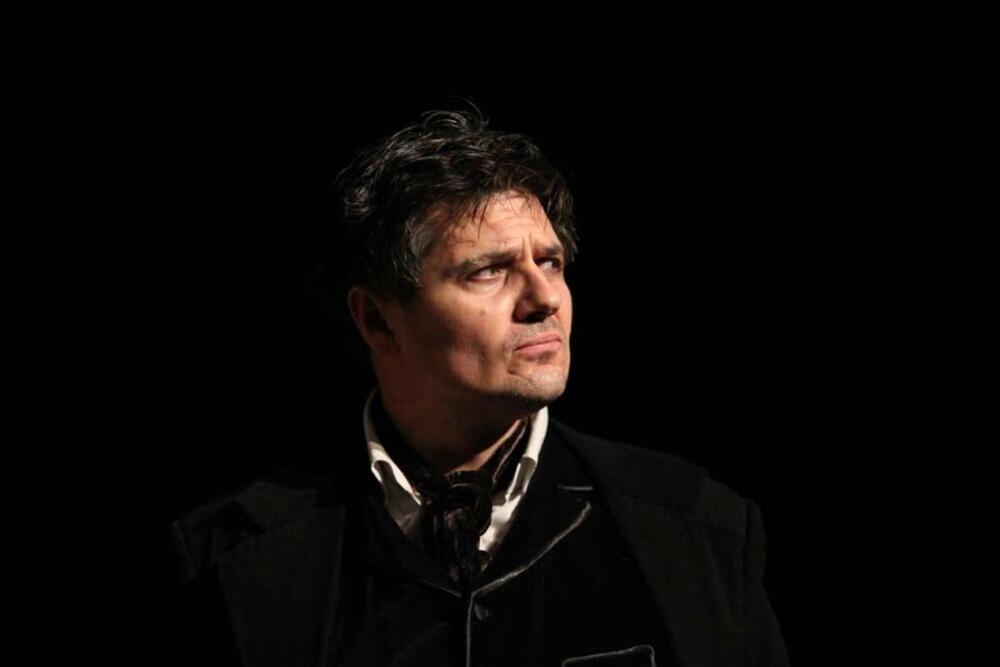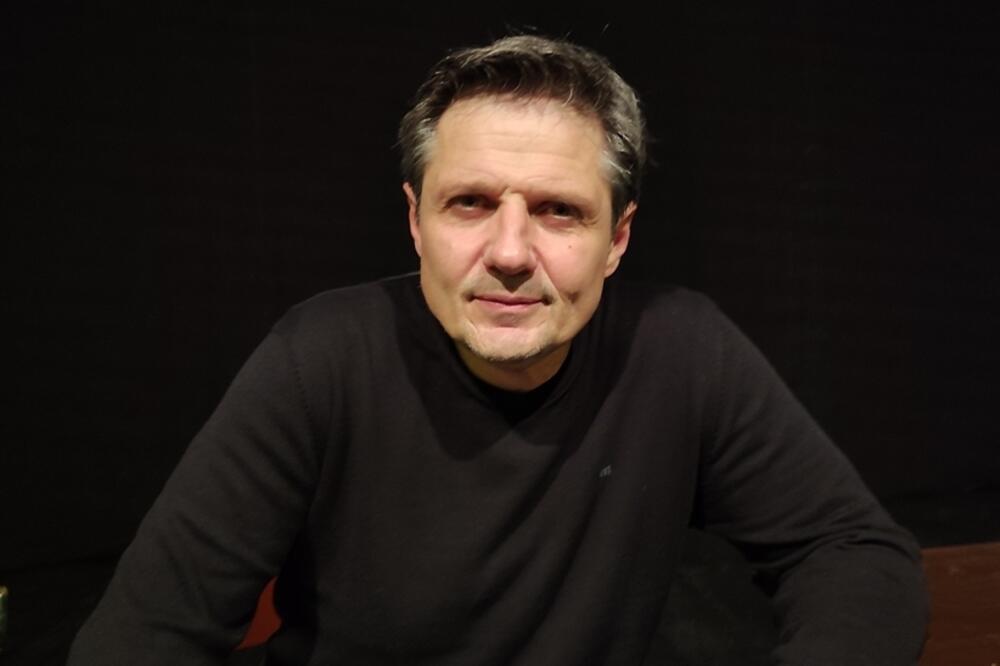"Power is given only to those who dare to bend down and pick it up. Only one thing is important, only one - to be able to dare", wrote the great of world literature, Fyodor Mikhailovich Dostoyevsky.
Nebojsa Dugalić, one of the most awarded, but also the most talented actors of the region, dared to tackle acting, to give sound to the silence and integrate the noise, to breathe life into the canvas and the stage, and the soul into the roles, to seduce and conquer the audience, to bring the magic of artistic of creation.
Actor, director, professor, drama champion of the National Theater in Belgrade, winner of two golden and as many "Silver Knights", four "Zoran mustaches", three "Sterija awards", "Zoran Radmilović" awards, a man who knows how to make us laugh and cry , but also to make us think. Nebojša Dugalić is all that...and much more than that.
Visiting the Nikšić Theater with his author's project, the monodrama "The Confession of Dmitri Karamazov", he spoke to "Vijesti" about victories and defeats, roles and life, about the game that continues even after our birth, about changes. About yourself...but also about us.
"Man changes every day. Appetites and hungers, criteria and views also change. A lot of things happen imperceptibly in us and a person, even if I think so, will never be aware of what has changed in him over time. What is important is that a person constantly feeds himself, that he actually feeds that inspiration he had at the beginning, which can never be the same as when we rushed headlong into a world and had a special imagination. As we all know from our professions, it is never what we first imagined. Our life is not in line with that at all. On the other hand, there is beauty and drama in that. A person needs to make an effort to figure out what has changed for him, and yet to find in himself some new incentives to say something more, offer, give, exchange".
He manages well to find these incentives, to always offer something new, even when it is the same performance, but also to provide the old things that the audience expects when they enter the temple of art - emotions and freedom, as well as the knowledge that "the world is a stage, on which everyone plays their role", and the theater "a separate country that encompasses the whole world"... And that there is no magic unless the actors and the audience become one.

"Considering that the world has changed a lot in the last few decades, and therefore the sensibility of the audience, the problems and focuses have changed. Some things that were important 30-40 years ago are no longer a subject of interest, they are some problems that belong to the past, at least that's what today's world thinks. That is a key question, given that life always surpasses us and so much surpasses everything that we can show on stage or on film. As Dostoevsky himself says: Life is more fantastic than any reality. I always wonder what it is that an actor from the stage could offer as content, as something that would be receptive to this world, that would make this world pause at least a little. Everything is so accelerated, we are bombarded with various content that we can no longer bear, it seems that we are so numb to every reaction, that nothing can surprise us or make us wonder anymore. We see things as a passing lane, nothing stays in us, so the question is really what to do. However, on the other hand, I believe that when theater and film make an effort to present real content, when we simply try to catch the audience in such topics, in the trap of such questions, that it can be something stimulating, that people understand that there are some more serious issues than of what we deal with on a daily basis. It may be an effort that in my opinion is valuable, perhaps in vain, but the fact that it may be in vain does not mean that it is less valuable".
Dostoevsky is a master of the written word, but also of psychoanalysis because he manages to go "into all the corridors of the human soul, to penetrate the depths of the human psyche." By acting on stage, Dugalić brings us closer to those characters, but also to ourselves, trying to make us ask ourselves at least one "why".
"As Dostoyevsky says: There are an awful lot of secrets and an awful lot of riddles on earth oppress man, and it's up to you to look for the riddle as best you know how and to get out of the water dry." It is obvious that some mysterious, inexplicable boiling is happening in us, as in that song that Dmitri tells his brother, and man is constantly in a gap between some realities, trying to recognize himself, but these elements keep turning him off the path, bringing him back, lifting him up to the heavens, then beat on the ground. It has always been like that, but man has to fight, he has to last, he has to exist, he has to strive. Many things are seductive, and what seduces a man is this incentive to strength, and whenever a man recognizes an opportunity to show strength, he hardly resists giving it up. What would you say Milovan Danojlic: My greatest victories are in giving up. Perhaps the greatest strength. Perhaps it is a riddle and a path that is of course difficult, because man must be strong, to survive, he must create, carry the world on his back, yes, as Dmitri, i.e. Dostoevsky, says - yes, a kind being, but also a hateful one. , so that he becomes your favorite hater".
It is often said about many actors that when you watch one of their movies or series, it's as if you've seen all the others, because they are recognized for playing the same characters or characters. For Nebojša Dugalić, this is not the case. The wide variety of characters that Dugalić has interpreted and interprets gives the audience the opportunity to convince themselves of the talent of the actor who never ceases to surprise the audience...but also himself.
"That should also be a task of acting, that transformation, not because we would fascinate anyone with the possibility and ability of transformation, but because that is the charm of this kind of creativity - to show a variety of different people, different ways of being in which certain existential problems common to all occur. I always tell my students to just look at people, that when they get on the bus they can immediately see 30 completely different destinies. All of them, both when they are silent and when they are not doing anything, have their own rhythm, some tempo inside. When we try to capture it differently, different worlds open up for us. In fact, this is where the materials and materials are collected for the possibility of transforming ourselves and not always being the same, recognizable, and so that what we do is not expected. Matija Bećković in one song he says: I don't care what others think, I care what I think, that's the only thing I don't know. That's how I perceive the space of acting - as a space for exploring everything I don't know about myself. It's an unfinished process and I always try to find some new areas of play that would be fresh and new for me, to surprise myself somewhere. "
He often plays characters from literature and historical figures in plays and films. Although it carries a certain amount of responsibility, he admits that such roles may be easier to do because they have a body that can be relied on.
"When you have great writers who have already described everything to you and you just need to have the imagination to imagine those characters, worlds, inner spaces and fractures, then the actor's task is to just 'throw it' to the extent to which a genius writer already done that. So it's a lot easier in that sense. When it comes to historical figures for whom we have recordings of what they looked like, it's easier because you can see what kind of character, what rhythm of being that person has. Every art has its own structure and that is the key. An actor knows how to choose and sort that material, to arrange it well, so that it is a solid construction that later works convincingly on stage. When it comes to dramatic characters, then you already have a wide space of creation and you can build that character without limitations".
In the character of Bora Pub, whom he portrays in the series "Time of Evil", which recently began broadcasting, he managed to throw Dobrica Cosic set up.

"Bora Pub, like all the other characters, is stuck in those stormy times and tries to save what can be saved in a situation where the chances of saving are very small. The key problem of the time is that no choice is good. Whatever you choose, you have only chosen a different kind of suffering. The line of my character was really very beautiful, because there is a great range of a man who has been through a lot, who is caught by another war, and then there are new fractures, new impossible dilemmas and choices. He has to save his family, he has to fight, and everything is getting out of his hands. Those collisions of worlds, ideological, national, all that actually got tangled up there, that's what is somehow grateful in that story. I'm glad that we somehow pushed it through, despite everything".
He swims equally well on stage and on screen and tries to play constantly.
"The stage offers the possibility of continuity, while on the canvas, work is done in shorter units. And again, on the screen there is a different possibility of playing. It's just that some minimalism that the camera obliges is a different kind of acting expression, a different kind of acting. After all, everything should be a game".
Man should and must play, because no matter how hard we try to gather all our thoughts into one point, we, just like Dostoevsky, will never succeed.
Award-winning director and professor
In addition to being a very successful actor, Dugalić entered the book of award-winning directors, and he is also a regular professor at the Faculty of Contemporary Arts (FSU).
"All my activities are actually working on the same thing from different perspectives, from different points. Nikita Mikhalkov once said in an interview: 'When I'm on stage, I have the impression that I could direct better than any director, and when I'm a director, I think I could act better than any actor, than any cow, and from every bush'. When a person moves to the side, then everything seems to him that it is much easier, but in fact it is not. It's always the hardest, where you stand, in that place. That is why it is perhaps useful and valuable when a person tries to shift his sights, and to try to look at the same space from several different sides, because then he sees how easy it is not to stand on the stage, and it is not easy to bring someone to the extent of the truth of the event."
Bonus video:




